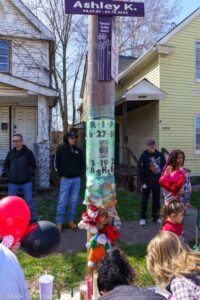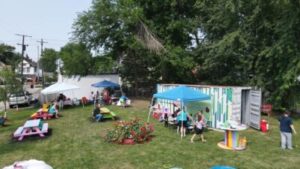By Mark Silverberg

On March 19, Ashley Knierim, daughter of Jack Kuhn and Ginny Knierim-Queen, tragically died of a drug overdose in Cleveland’s Slavic Village neighborhood. Ashley had grown up and lived her whole life in that community. Many people knew and loved her. On April 2, 2023, family and friends gathered with Ashley’s parents for a candlelight vigil and balloon release in her memory.

The mix of neighbors in attendance represented the diversity of the community. White, Black, and Latino talked, mingled, hugged, and shared stories. Some of these stories were about how drugs destroy families.
Time and time again, community members with mental health challenges have been lost to hard drugs while in search of self-medication. Odetta Fields, a longtime resident and friend to many in attendance, invited residents to visit the Southeast Cleveland Resource Center, where they can get free Narcan, fentanyl test strips and harm reduction information. These are offered with no questions asked.

A wooden cross attached to a nearby telephone pole held Ashley’s name and dates of her birth and death.
“In Slavic Village, drug use is widespread, and a significant amount of the drugs being sold as heroin, cocaine, etc. contain fentanyl and other unknown substances, which greatly increases risks,” according to Bethany Roebuck.
Roebuck is the Executive Director of Thrive for Change, a local non-profit organization focused on harm reduction. “There is an epidemic of overdoses, infections, and deaths from this unpredictable street supply, which can be seen both in Slavic Village and in communities across our country. The health care system in our country was not designed, nor has the capacity, to tackle the many factors of this epidemic

including poverty, lack of mental and public health funding, and unaddressed layers of trauma, all stemming from a system of ineffective drug policies and stigma.”
“Another contributing factor to the current epidemic is the lack of staffing in many support services. People spend many hours on hold on
the phone to apply for food stamps or Medicaid.” So says Sara Szelagowski, Founder and Program Director of Project White Butterfly. “The result is they cannot apply for or receive the benefits they need. This contributes to food insecurity, untreated mental health issues, and people not getting the medical care or prescriptions they need. Not having peoples’ basic needs met are factors which can contribute to ongoing substance use.”

Their first fundraiser will be on June 18th at the Arbor Pavilion in Newburgh Heights from 3-9 pm. For more information and to get tickets please contact Jack Kuhn at (216) 536-0621.
Jack and Ginny thanked the more than one hundred people who came to honor Ashley’s memory. Candles were lit and prayers were said. Odetta points out The Garden of Life. It is a community garden that will soon be refreshed with art and information on the themes of mental health, harm reduction and community care. Odetta excitedly observes,

“The neighborhood is coming back!”
They needed comfort and support from each other, deeply hoping to find meaning in Ashley’s death.
To address these challenges, Jack and Ginny are starting a foundation. It will create educational resources around the risks of drug usage by people with mental health challenges. These resources will be located at the Southeast Cleveland Resource Center, and will help community members identify and respond to warning signs with the help people need.
 Their first fundraiser will be on June 18th at the Arbor Pavilion in Newburgh Heights from 3-9 pm. For more information and to get tickets please contact Jack Kuhn at (216) 536-0621.
Their first fundraiser will be on June 18th at the Arbor Pavilion in Newburgh Heights from 3-9 pm. For more information and to get tickets please contact Jack Kuhn at (216) 536-0621.
Jack and Ginny thanked the more than one hundred people who came to honor Ashley’s memory. Candles were lit and prayers were said.

Odetta points out The Garden of Life. It is a community garden that will soon be refreshed with art and information on the themes of mental health, harm reduction and community care. Odetta excitedly observes, “The neighborhood is coming back!”






